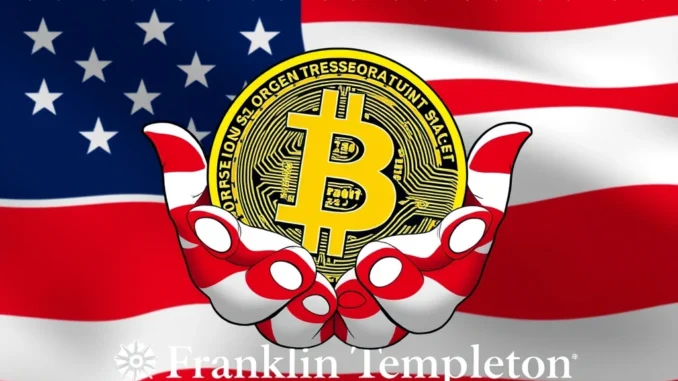
In a powerful endorsement for the cryptocurrency realm, financial giant Franklin Templeton has lauded the United States’ Bitcoin holdings as a significant stride towards solidifying Bitcoin’s place in the global financial landscape. This isn’t just another day in crypto; it’s a potential paradigm shift. Let’s dive into why Franklin Templeton is so bullish about this development and what it could mean for the future of Bitcoin and the broader economy.
Why is Franklin Templeton Calling the US Bitcoin Reserve a ‘Historic Milestone’?
Franklin Templeton, a well-respected name in the investment world, isn’t known for making rash statements. When they call the U.S. Bitcoin strategic reserve a ‘historic milestone,’ it’s worth paying attention. Their assessment is rooted in the idea that a nation-state, especially one as influential as the United States, holding a significant Bitcoin reserve inherently elevates Bitcoin’s status. It moves Bitcoin further away from the fringes and closer to mainstream acceptance.
Here’s a breakdown of why this is such a big deal:
- Legitimacy Amplifier: Governmental involvement, particularly in a reserve capacity, significantly bolsters the perceived legitimacy of Bitcoin. It signals to the world that Bitcoin isn’t just a speculative asset but something with recognized value and potential.
- Institutional Green Light: Nations holding Bitcoin can pave the way for institutional investors who might have been hesitant to enter the crypto space. Seeing a government take a position could reduce perceived risk and encourage broader adoption.
- Fiscal Stability Implications: Franklin Templeton suggests that US Bitcoin holdings could even play a role in improving fiscal stability. This is a bold statement, hinting at Bitcoin’s potential to act as a hedge or a diversifier in national reserves, traditionally dominated by gold and fiat currencies.
The US Government’s Bitcoin Strategy: Holding, Not Selling
Adding another layer of intrigue to this narrative is the U.S. government’s decision regarding its seized Bitcoin. With approximately 200,000 BTC in its possession, the choice of what to do with it was crucial. Franklin Templeton highlighted the significance of the U.S. government choosing not to sell these assets. This decision sends a powerful message:
| Decision | Implication |
|---|---|
| Holding 200,000 BTC | Indicates long-term belief in Bitcoin’s value proposition. |
| Not Selling | Reduces potential market volatility from a large sell-off. |
| Sets Precedent | Encourages other nations and large institutions to consider holding Bitcoin as part of their reserves. |
This strategic hold is a stark contrast to a potential fire sale, which could have negatively impacted Bitcoin’s price and sentiment. Instead, the U.S. government’s stance is being interpreted as a vote of confidence in Bitcoin’s future.
Could This Encourage Global Bitcoin Adoption?
Franklin Templeton’s analysis goes beyond just the U.S. situation. They posit that the U.S. government’s approach could be a catalyst for wider global Bitcoin adoption. Imagine a scenario where other nations, observing the U.S., start to consider Bitcoin as a legitimate reserve asset. This could trigger a domino effect, leading to:
- Increased Demand: As more nations and institutions consider holding Bitcoin, demand could surge, potentially driving up its value.
- Geopolitical Implications: Nations holding Bitcoin might find new avenues for international trade and finance, potentially reducing reliance on traditional financial systems.
- Further Legitimacy: Each additional nation or institution that adopts Bitcoin further solidifies its position as a globally recognized asset.
What are the Potential Benefits of Bitcoin Reserves for Fiscal Stability?
The idea that Bitcoin could contribute to fiscal stability might seem unconventional to some. However, Franklin Templeton touches upon a critical aspect of modern finance – diversification and hedging. In a world of fluctuating fiat currencies and economic uncertainties, Bitcoin offers some unique characteristics:
- Decentralization: Bitcoin is not controlled by any single government or central bank, making it less susceptible to localized economic policies or political instability.
- Limited Supply: The capped supply of 21 million Bitcoins offers a degree of scarcity, potentially acting as a hedge against inflation in the long term.
- Global Accessibility: Bitcoin operates 24/7 across borders, offering a globally accessible and transferable asset.
While it’s still early days to definitively say how Bitcoin reserves will impact fiscal stability, the conversation is undoubtedly shifting. Major financial players like Franklin Templeton are acknowledging and exploring these possibilities, which is a significant step forward.
Is Bitcoin Becoming a Mainstream Reserve Asset?
The narrative around Bitcoin is constantly evolving. From its early days as a niche digital currency to now being discussed in the context of national reserves, the journey has been remarkable. Franklin Templeton’s perspective underscores a crucial turning point – the increasing acceptance of Bitcoin by traditional financial institutions and, potentially, governments.
Key Takeaways:
- Franklin Templeton views the US Bitcoin reserve as a landmark event, enhancing Bitcoin’s legitimacy.
- The US government’s decision to hold seized Bitcoin is seen as a positive signal.
- This could encourage broader institutional and national adoption of Bitcoin.
- Bitcoin’s potential role in fiscal stability is being seriously considered.
In conclusion, Franklin Templeton’s analysis paints a compelling picture of a maturing Bitcoin ecosystem. The ‘historic milestone’ of the US Bitcoin reserve isn’t just about numbers; it’s about perception, legitimacy, and the evolving role of cryptocurrency in the global financial order. As more established players like Franklin Templeton voice their support and explore the possibilities, the trajectory of Bitcoin’s journey towards mainstream acceptance looks increasingly promising. This is a space to watch closely, as the implications could be transformative for the future of finance.



